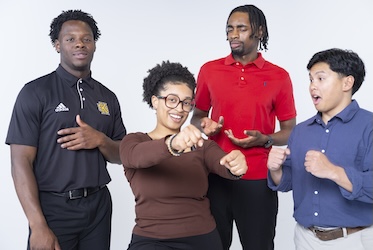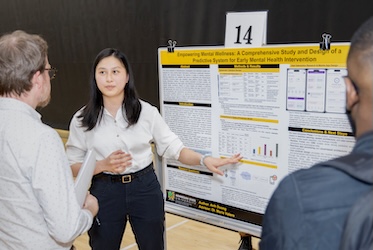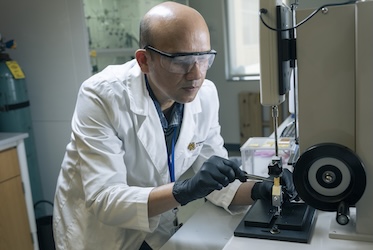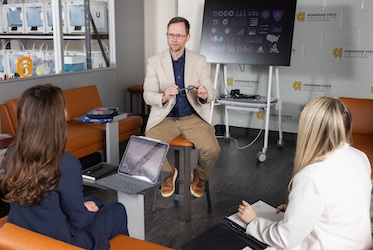
Symposium of Student Scholars
KENNESAW, Ga. | Apr 21, 2017
Research activity among students increases at Kennesaw State

Nearly 450 undergraduate and graduate student researchers showcased their academic findings during the 22nd annual Symposium of Student Scholars – the largest one in university history – in the Convocation Center at the Kennesaw Campus on April 20.
This is the first year that graduate students were invited to participate in the symposium, making it inclusive of all students, explained Amy Buddie, director of Undergraduate Research and organizer of the annual event. Students displayed their research during two poster sessions and an oral presentation session.
“Students are increasingly getting the message that engaging in a meaningful research project can really help them grow both academically and personally. They become better problem-solvers, better critical thinkers, better writers, better public speakers,” said Buddie. “It’s become so humongous that we needed to create two poster sessions instead of one.”

Co-sponsored by the Undergraduate Research Club and the Office of Undergraduate Research, the symposium brought together research from all 10 degree-granting colleges at the University for the first time. Nearly 270 projects were showcased, with 389 undergraduate students, 51 graduate students, and 136 faculty participating.
Undergraduate biology students Courtney Willett and Madison Hupp conducted research related to Akirin, a protein essential to cell development. Exploring the skeletal cells of flies, Willett wanted to understand cell signaling and how muscle abnormalities occur.
“My research is trying to map the process of myogenesis,” Willett said. “This characterization study will help us to further the understanding of diseases such as muscular dystrophy in humans.”
Hupp explored the cardiac cells of flies to determine why some cells don’t contract in a similar pattern, leading to a better understanding of heart disease. The pair were recently invited to present their research at the International Drosophilia Conference.
Many students reported that the research process is enhanced when there is practical application to their findings.
Undergraduate and graduate student researchers in software engineering studied how to extract meaningful data from a software application using simulation. Their project, “Enhancing Elicitation Activities Using Virtual Reality,” explores ways to determine users’ wants through virtual reality, when perhaps the users aren’t even sure of what they want or need.
“It’s like a middle layer,” said Aman Bhimani, a software engineering graduate student. “The environment, through the technology, speaks to us instead of getting it directly from the user.”
Nearly 50 students presented their research at the National Conference on Undergraduate Research in Memphis during spring break. Kennesaw State will host NCUR in 2019.
“The research experience helps them get jobs, and it helps them get into graduate school. So they're seeking out these opportunities more and more,” Buddie said.
Huggins Msimanga, professor of chemistry, has been involved with the research symposium since it first started 22 years ago. He said that his students’ curiosity to understand new advances in chemistry instrumentation is what propels them to conduct research.
Besides supporting student research projects for the symposium, some faculty also served as judges for the poster and oral presentations.
“I love that the students have this opportunity to talk and present their research in this way. It’s very different than in the classroom,” said Janeen Amason, assistant professor of nursing.

Another feature added to the symposium this year was the Three Minute Thesis, a research presentation competition now in its third year at KSU. Using only one PowerPoint slide with no video, graduate students presented their master’s theses in under three minutes.
Research Symposium Awards
Undergraduate Poster Session
1st place ($200) - “The Relationship Between Childhood Trauma Exposure and Fear-Potentiated Startle”, Students: Cheyenne Ashley, Luana Scienza, Rebekah Fallin, Jesse Edmond, Jasmine Williams, Tiana Britton, Jamie Miller
Faculty advisor: Ebony Glover
2nd place ($100) - “Analysis of General Chemistry Lecture Discourse Regarding Gases and its Effect on Students’ Perception of Chemical Representations at the Macroscopic, Submicroscopic, and Symbolic Levels”, Amber Gallimore, Isaac Brozino, Joshua Sukumar, Kersten Forsberg
Faculty advisor: Michelle L. Head
Undergraduate Oral Presentation
1st place ($200) - “Decoding the X: Discovering the Black Experience”, Skylar Resna Jackson
Faculty advisor: Angela Farr Schiller
2nd place ($100) - “Using Fear-Potentiated Startle to Examine Sex-Related Factors in Test Anxiety”; Rebekah Fallin, Luana Scienza, Bethany Wyman, Nhat Nguyen, Jesse Edmond, Jasmine Williams, Tiana Britton, Jamie Miller
Faculty advisors: Ebony Glover and Sharon Pearcey
Library Undergraduate Research Award
Kylah Pollard and Sarah Bauguess – “Prevalance and Incidence of Health Risk Factors Among Adolescent Girls” Faculty mentor: Mohammed Chowdhury
Three Minute Thesis (3MT)
1st place ($500) – Aaron Ledet, M.S. in Chemical Sciences, "Signed, Sealed, Delivered: CPP Technology Delivers Active Protein Cargo to Cells"; Faculty Advisor - Susan Smith
2nd place ($300) – Kathryn Wilhite, M.S. in First Year Studies, "An Exploratory Study of the Impact of Language on the Transition and Success of Students in Their First College Year"; Faculty Advisor - Stephanie Foote
People’s Choice ($200) – Alex DeWitt, M.S. in Applied Exercise and Health Science, "A Comparison of Body Composition Methods and Reliability of the SKULPT Chisel"; Faculty Advisor - Cherilyn McLester
Graduate Poster Session
1st place ($200) - "Toward the Synthesis of a Novel tris-N-Heterocyclic Carbene”, Richard Justice, Maleek Montgomery
Faculty advisor: Daniela Tapu
2nd place ($100) - “Improving the Prediction Accuracy of Text Data and Attribute Mining with Preprocessing”, Priyanga Chandrasekar
Faculty advisor: Kai Qian
Graduate Oral Presentation
1st place ($200) - “Response of Metabolic Biomarkers Following a Short and Long Bout of High-Intensity Functional Training”, Cassie Williamson, Emily Bechke, Paul Bailey
Faculty advisors: Brian Kliszczewicz, Robert Buresh, Yuri Feito
2nd place ($100) - “Implementing Peer Training as an Evidence Based Practice to Support Social Communication and Interatctions in Young Children with Autism”, Jasmine Ennis
Faculty advisor: Melissa Driver
– Tiffany Capuano
Photos by David Caselli
Related Stories

Kennesaw State to revive bathtub race tradition with new video game

Passions spark innovation at Kennesaw State Symposium of Student Scholars

Kennesaw State researcher tackling sustainability through use of transparent wood

Kennesaw State marketing students apply research skills to the real world by assisting nonprofits
A leader in innovative teaching and learning, Kennesaw State University offers undergraduate, graduate, and doctoral degrees to its more than 47,000 students. Kennesaw State is a member of the University System of Georgia with 11 academic colleges. The university’s vibrant campus culture, diverse population, strong global ties, and entrepreneurial spirit draw students from throughout the country and the world. Kennesaw State is a Carnegie-designated doctoral research institution (R2), placing it among an elite group of only 8 percent of U.S. colleges and universities with an R1 or R2 status. For more information, visit kennesaw.edu.














